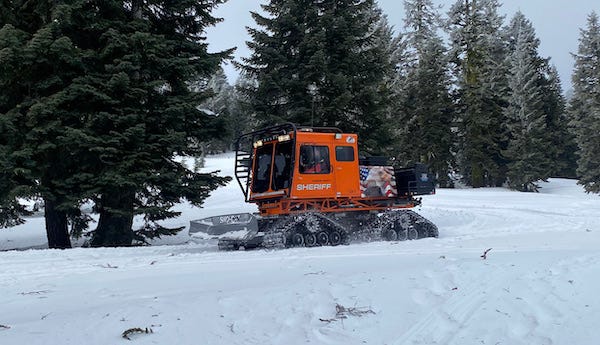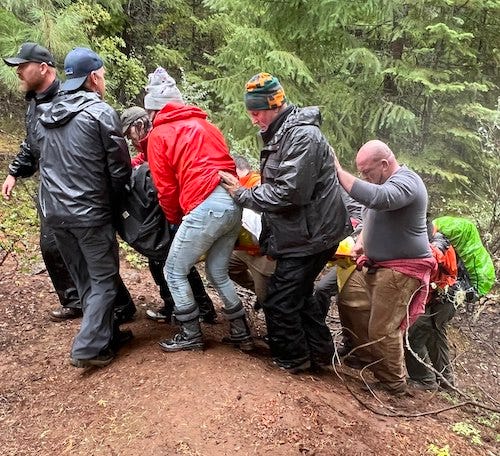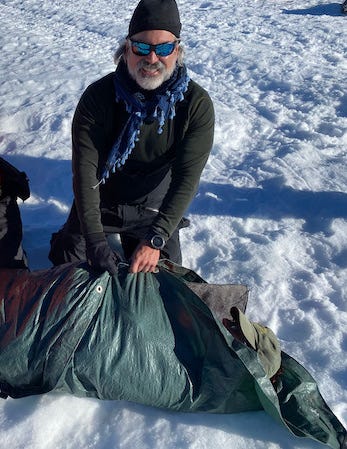It seems that you have been living two lives. In one life you are a respectable computer programmer. You write crypto apps. Design cool things for Raspberry Pis. Build automated doors for your chicken coop. The other life is lived in the wilderness.
I remember how excited I was in my teenage years when I first played SpaceWar on the PDP-6 at MIT. I was absolutely thrilled by the cool technology. But what really rocked me, was how willing the inventors were to share the knowledge of its inner workings and how much they encouraged me to get hands-on experience.
Later I encountered this same ethos of sharing and willingness to help others to learn skills in places like the home-brew computer hackers of the 1970s, the CipherPunk movement of the late 90s, and the Raspberry pi / Arduino communities.
But this mindset of learning skills and using them to help others is hardly limited to the tech world. Most recently I have been blessed to participate in another community of outstanding people. I am a volunteer at my local sheriff’s Search and Rescue team.
Search and Rescue
I live in Jackson County Oregon. We have an amazing selection of outdoor opportunities. You can camp, hike, ski, snowshoe, raft, kayak, hunt, fish, ride horseback, mountain bikes, ATVs, snowmobiles, etc. From mountain elevations of more than 9,000 feet to the swift waters of the Rogue River, the weather can range from extremely hot summer days to whiteout snowstorms.
As you can imagine, there is also ample opportunity to get into serious mishaps. So much so, we typically see around 175 incidents each year that require the activation of Jackson County Search and Rescue (JCSAR).
In the US, the responsibility of Search and Rescue (SAR) can vary from state to state, but in Oregon, civilian SAR is mandated as a responsibility of the Sheriff’s Office. Among other things, this arrangement facilitates interoperability between counties. But it is an unfunded mandate. And thus, notwithstanding a few exceptions, JCSAR is staffed primarily by volunteers.
But these volunteers are still rescue professionals. They undergo extensive training to meet rigorous standards. Often it’s a physically and mentally demanding job. There can be callouts at all hours, kinds of weather, and terrain conditions.
Training, and lots of it
One of the best things about working in a SAR unit is the opportunity to train and learn skills. All operational members must first undergo basic SAR training. Where they become proficient in skills such as map reading, navigation, search techniques, tracking, field survival as well as basic first aid. Members must also learn about evidence handling, HAZMAT awareness, how incident command functions, and things like defensive driving techniques (since they need to be able to drive the JCSAR vehicles). SAR candidates must also assemble their own 24-hour rescue packs before they can be considered mission ready.
All Oregon SAR members must also complete the Oregon State Sheriff’s Association SAR academy. This ensures that they have compatible skills when doing joint callouts with other counties.
After the members have completed their probationary period, checkoffs, and participated in a number of missions, they can apply to become a permanent member. At that point, they also have the opportunity to join a specialty team. These teams include:
Technical rope rescue
Dive team
Snow/avalanche rescue
Large animal rescue, (as in, my horse walked into a swimming pool)
ATV
Mountain bike teams
Mounted (horses)
K9 searchers
Drone operators
Trackers
Medical team
Incident command team
Playing in the snow
I mentioned above that in the winter months, Jackson County and the sounding area have a number of recreational snow activities available. Naturally, JCSAR needs to be ready to do rescue in the snow. This includes some neighboring regions such as Mount Ashland, Crater Lake, and Mount Shasta.
My favorite recreational interests include snowshoeing and mountaineering, and usually far away from where most people wander. Naturally, I applied to join the Snow Rescue team as part of my specialty training where I had the opportunity to learn about avalanche awareness and rescue.
Until I took the training, I had no clue just how close I came to disaster when I first started snowshoeing. Avalanches in the snow are no joke.
Medical Training
A Search and Rescue medical provider’s mission is slightly different from what an EMT might experience on an ambulance or fire department team. Often the patient is found in a remote or challenging location. They must first be reached by the provider before any lifesaving treatment can occur, and then the provider must also figure out a way to package and evacuate the patient to better care.
In Oregon, the rules defining scope of practice requires that all medical emergency provider (EMS) be licensed, to operate in the state. SAR providers typically also train as a Wilderness First Responder (WFR)
While I had a little bit of emergency medical training from my adventures prior to JCSAR involvement, to be considered as a medical team member I needed to undergo a fair amount of formal training.
I started with the NOLS Wilderness First Responder course and then followed it up with the EMR bridge. This allowed me to be tested by the National Registry of Emergency Medical Technicians. Which by the way, required a fair amount of preparation. Once I passed that, I was able to apply for my Oregon EMS license.
This sounds like a lot of work, and it was, but it made me more competent and capable to help out in a mission. I write about this adventure in detail in a later article.
The Real Reward
Not all SAR missions involve rescue in remote locations. Because of our ability to organize, communicate and get the job done, you will often find JCSAR helping provide safety in community events.
In the last year alone, I have had the opportunity to spend time helping the homeless, providing food to those less fortunate, working traffic control for parades, and even assisting other public safety agencies in their training.
The people I meet are often grateful and happy to have us around. Volunteering with Search and Rescue enables us to do good things for our community as a whole and sometimes the people who need us most. That is often a reward in itself.










